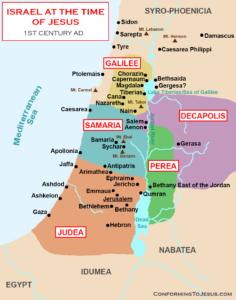Something I love about the Word of God is that it does not omit anything or leave unanswered questions as to how to act in situations that are fundamental to our behavior or attitude as believers, especially when it comes to a brother or sister that may be different than we are. And I would like to stress that I used the words “brother or sister.”
One of my favorite biblical stories speaks of a woman with a “questionable reputation”, culturally and diametrically opposed to what our society and the society at that time would consider an excellent model to imitate or follow. This woman was not Jewish. On the contrary, this woman represented everything a Jew rejected and detested at the time. This woman came from Samaria, a place that, due to the many invasions of other nations, became racially mixed. For this reason, the Jews considered them mestizos or people of mixed race and, therefore, despised them. This was how the Jews traditionally treated the Samaritans.
In the Gospel of John, chapter 4, however, we find the story of a different kind of Jew and how he approached and treated different ethnicities and cultures. This Jew understood the importance of obeying God before following the ways and norms dictated by society. His life’s purpose was above any social and cultural framework or pattern.
 Historically, devout Jews avoided even walking through Samaria. Imagine a prejudice so imbedded in the culture at the time that if they had to leave Judea to go to Galilee, which borders Samaria, they took the long way and passed through Perea and Decapolis even though it took them much longer. By doing so, they avoided dirtying their feet with even Samaritan dust. This would be like if you were in New York and wanted to go to Michigan but didn’t want to pass through Ohio because you didn’t like its people. So, taking the long way would be going through New York, Pennsylvania, West Virginia, Kentucky, Indiana, and, after traveling much longer, you would finally arrive in Michigan. Crazy, right? But that is how the Jews were at that time.
Historically, devout Jews avoided even walking through Samaria. Imagine a prejudice so imbedded in the culture at the time that if they had to leave Judea to go to Galilee, which borders Samaria, they took the long way and passed through Perea and Decapolis even though it took them much longer. By doing so, they avoided dirtying their feet with even Samaritan dust. This would be like if you were in New York and wanted to go to Michigan but didn’t want to pass through Ohio because you didn’t like its people. So, taking the long way would be going through New York, Pennsylvania, West Virginia, Kentucky, Indiana, and, after traveling much longer, you would finally arrive in Michigan. Crazy, right? But that is how the Jews were at that time.
Beloved, how beautiful is to see that Christ is impartial towards people, regardless of the differences that seem so prominent to us, and that he makes and sees us equal. My favorite passage of this chapter in John is precisely verse 4 and it says, referring to Jesús: “…he had to go through Samaria.” God had put an appointment on his calendar to meet with a woman and have a deep conversation despite the cultural norm of seeing her as “less than worthy’. Dear brothers and sisters, God is always willing to break the patterns that we often establish in our ignorance and, by doing so, He shows us His love and mercy so he can reach us.
It is interesting to note that the meeting took place at Jacob’s Well, both Samaritans and Jews acknowledged the importance of this historic place. When we want to deal with cultural or ethnic differences, it is vital and necessary to first find something we agree on. Our mistake is that we often prioritize and give relevance to our differences, and these drown out anything that could unite us.
This woman visited the well at the time when the sun was the hottest, when people stayed in their homes and avoided going out. She did not want to see anyone, she did not want to hear judgmental words of rejection, and she did not want to deal with more of the finger pointing she was so familiar with. To her surprise, when she arrived at the well there was a man there and, as if this wasn’t enough, the man was Jewish and asked her for water. Consider the woman’s answer: “The Samaritan woman said to him, “You are a Jew and I am a Samaritan woman. How can you ask me for a drink?” (For Jews do not associate with Samaritans.)”.
Not only did the Lord speak to her, but, even more astonishing, he was willing to touch with his lips and hands the jar of water that the woman held in her hands.
Brothers and sisters, this story has many other aspects I could emphasize today but, to me, the most important one the story offers is the idea that there is a God and Savior who is impartial towards people, a God who is no respecter of persons, who is willing to break with the patterns and barriers established by society to reach, restore, and save a life that imperiously needed it.
That day, the life of this Samaritan woman changed forever because a very special Jew, Emmanuel, God with us, revealed himself to her and opened the door of opportunity to which she was entitled, just like anyone else.
Beloved, to have cultural awareness implies allowing God to break, change, and transform our way of thinking, responding, and acting to break free from the established social patterns.
Where is this Samaritan with whom God wants you to meet today?
The cultural climate that we live in today in this country has pushed many who identify as “Christians” to have attitudes and make judgements that in no way represent the kingdom’s values. The true believer is the one who, obeying the Word of God, does not look at differences but, on the contrary, despite them, can see his fellow man as a brother in Christ, without considering color or race which may make us different or give us specific privileges.
Dear and beloved friends, since we are celebrating our Cultural Awareness Week I will like to close with some quotes from that great man, Martin Luther King that reminds us:
“Injustice anywhere is a threat to justice everywhere.”
“Darkness cannot drive out darkness; only light can do that. Hate cannot drive out hate; only love can do that.”
“Life’s most persistent and urgent question is, ‘What are you doing for others?”
“We must learn to live together as brothers or perish together as fools.”
Dear brothers and sisters, there is only one race, the human race, and only one nation or group of people will exist in heaven: God’s people.

written by Major Eric Rodriguez, Territorial Mission & Culture Secretary, USA East




